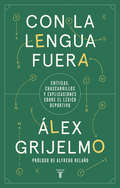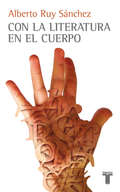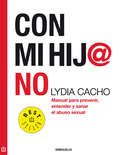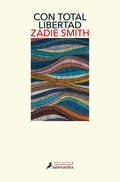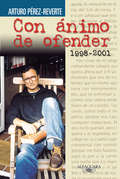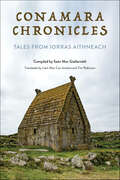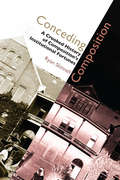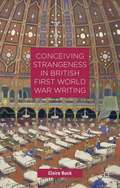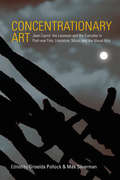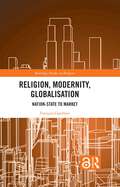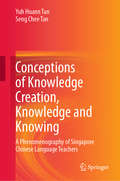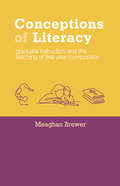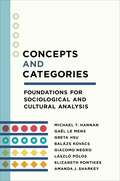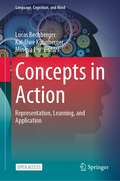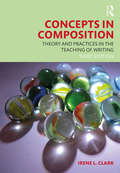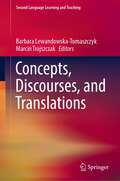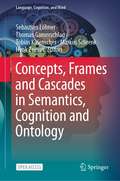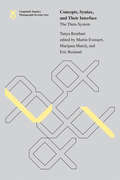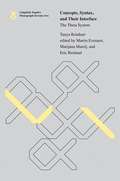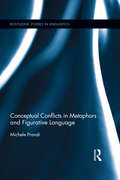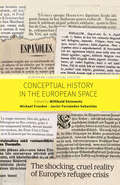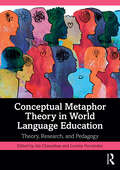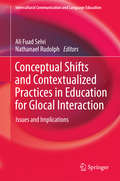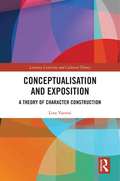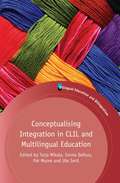- Table View
- List View
Con la lengua fuera: Críticas, chascarrillos y explicaciones sobre el léxico deportivo
by Álex Grijelmo¿Un jugador equivoca un tiro? ¿Existen las finales a cuatro? ¿Puede un equipo ser más líder en una jornada respecto a la anterior? ¿En el mundo del deporte se utilizan metáforas como en la poesía? La lengua en el deporte da mucho juego. Entre 2016 y 2019, Álex Grijelmo publicó en As una serie de artículos sobre la lengua española en el deporte de los que ahora pueden disfrutar todos los lectores interesados en el idioma y en su tratamiento en los medios de comunicación. En ellos el autor muestra cómo el léxico utilizado por deportistas, comentaristas y periodistas se mueve entre la tradición, la innovación y los extranjerismos, y los usos incorrectos que empobrecen el lenguaje o le privan de eficacia y belleza. Pero también le reconoce hallazgos léxicos, metáforas brillantes y frases memorables. En este libro hay propuestas de mejora del estilo junto con elogios hacia aportaciones certeras. Se habla de fútbol, de baloncesto, de balonmano, de boxeo, de tenis, de los deportes de motor... Pero sobre todo, se habla de la lengua española. Un tema que da mucho juego. «Píldora tras píldora, constituía un tratamiento que en el tiempo fue haciendo efecto. Comprobé cómo poco a poco redactores descuidados dejaban de serlo, se ahorraban latiguillos, sustituían barbarismos por su adecuado equivalente en castellano. Y cuando alguno no lo hacía, no faltaba quien se lo decía con las tablas de la ley en la mano, como se llegó a conocer en la redacción aquella serie de instrucciones-reconvenciones que Grijelmo desarrollaba [...]. El deporte tiene un alto consumo y todo lo que se haga para que no envicie sino limpie el castellano es justo y necesario. Eso le da un valor único a estas píldoras medicinales que Álex Grijelmo escribió, según él, con la lengua fuera.»Del prólogo de Alfredo Relaño La crítica ha dicho:«Nuestros textos se enriquecerían si prestáramos atención a las reflexiones de Álex Grijelmo.»Soledad Gallego-Díaz, El País «Un libro didáctico que se lee con la pasión de una novela.»Gabriel García Márquez, sobre El estilo del periodista «Grijelmo viaja a los orígenes de nuestra lengua y de sus asuntos de género para evitar confusiones y expresiones tan políticamente correctas como ridículas.»Laura Revuelta, ABC, sobre Propuesta de acuerdo sobre el lenguaje inclusivo «Si alguien aúna con esmero periodismo y preocupación por el lenguaje, es Álex Grijelmo.»El País
Con la literatura en el cuerpo
by Alberto Ruy SánchezUn diálogo con los habitantes del gran sueño melancólico del siglo XX Dieciséis ensayos narrativos escritos con la prosa que caracteriza a Alberto Ruy Sánchez, retoman a una protagonista, la melancolía, que se pronuncia por el yo y reivindica el cuerpo. Los ensayos se dividen en tres secciones. En la primera, "Memorias de catedrales góticas", se comenta la obra y vida de escritores poseídos por fuerzas que los arrebatan y cuyo torbellino vital es visible en su obra: Rilke, Alberto Savinio, Pier Paolo Pasolini, Italo Calvino, Marguerite Yourcenar, Samuel Beckett, Max Frisch y Victor Hugo. La segunda, "Memoria de prisiones góticas", reúne a escritores bajo el efecto destructivo de regímenes dictatoriales. Aquellos que sobreviven llevan la huella de esa sombra sobre su piel: Mijail Shostakovich, Nadiezhda Mandelstam, Eugeny Zamiatin, George Orwell, Panait Istrati, Herling, Dostoievski y Solzhenitsyn. La tercera, "Memoria de tumbas góticas", reúne a escritores desaparecidos mientras este libro se fue escribiendo. Cada ensayo es una lápida, una frase hacia ellos: Michel Foucault y Roland Barthes.
Con mi hij@ no: Manual para prevenir, entender y sanar el abuso sexual
by Lydia CachoUna radiografía completa del abuso sexual a menores. Desde sus orígenes, las culturas en las que se ha fomentado y los porqués, los protagonistas, las consecuencias, las formas de afrontarlo y las acciones que se pueden tomar para contrarrestarlo y combatirlo. Con mi hij@ no es un manual para toda la gente que tiene contacto con menores de edad: madres, padres y profesionales de la educación y la justicia que quieran saber cómo hablar con las y los niños sobre sexualidad y prevención del abuso, cómo detectarlo; qué decir y qué no a una víctima. Este libro nació en los más de 3000 correos electrónicos recibidos por Lydia Cacho tras publicarse Los demonios del Edén, en que sus lectoras y lectores compartieron con ella su más grande secreto: que sufrieron abuso sexual en su niñez o que sus propias hijas e hijos lo padecieron. Otras personas buscaban orientación para proteger a sus pequeños. Asíque, preocupada por la inmensa cantidad de casos y el terrible escenario, Lydia Cacho redactó este manual para contrarrestar el abuso sexual infantil. Escrito en un lenguaje ágil y con el particular estilo de Lydia Cacho, Con mi hij@ no traza una radiografía del abuso sexual a menores. Desde los orígenes históricos en que se ha fomentado hasta los perfiles para detectar a pedófilos y pederastas. Nos muestra cómo hasta los casos más difíciles pueden sanar con la ayuda adecuada; explica qué es el estrés postraumático y cómo funciona la química del cuerpo ante la violencia. Ilustra con anécdotas y casos conmovedores los caminos para denunciar, sanar y erradicar la violencia sexual. Reforzada en una profunda investigación, en entrevistas con expertos en el tema y por su fructífera experiencia personal, la autora nos ofrece en estas páginas valiosas herramientas para evitar, combatir y superar el abuso infantil.
Con total libertad
by Zadie SmithUn libro cargado de agudeza, frescura y empatía que nos ilumina en un mundo cada vez más cambiante y contradictorio. Zadie Smith ha demostrado ser una ensayista brillante y singular, haciendo que cada texto suyo sea un acontecimiento literario por derecho propio. Con total libertad, que recopila algunos de los más celebrados, abarca el amplísimo rango de intereses de Smith: desde todas las facetas de la cultura y la libertad artística hasta los temas más acuciantes de la política y la actualidad, siempre desde una perspectiva original y radicalmente personal. Gracias a su fina agudeza, una frescura contagiosa y una empatía extraordinaria, este libro es una guía imprescindible para entender un mundo, el nuestro, cada vez más complejo y contradictorio. La crítica ha dicho:«Ecléctica en sus gustos y centrífuga en su estilo, Zadie Smith disfruta, como articulista, de ampliar los límites de su pensamiento [...] En la línea de Hazlitt y Orwell, Woolf y Angela Carter.»The Financial Times «Interesante, sagaz [...]¿Se debe leer este libro brillante? ¡Por supuesto que sí!»The Independent «Un libro inteligente, ingenioso y a menudo hilarante que demuestra que (Zadie Smith) es una de las mentes más brillantes de la literatura británica de hoy en día.»NPR «Es un placer exquisito observar a Zadie Smith pensar a lo largo de estas páginas.»The New York Times Book Review «Smith lleva a la escritura de artículos sus dotes como novelista: buen ojo para el detalle, sutiles giros en las frases.»The Boston Globe «Estos ensayos en su conjunto reflejan una mente abierta, vivaz, natural, rigurosa, erudita y seria, ocupada en perfeccionar su manera de ver la vida, la literatura y la relación entre ambas. Smith demuestra que es mucho más que una cabeza adulta y comprensiva sobre unos hombros muy jóvenes. Y lo demuestra con su apasionada, compulsivamente dialéctica y atractiva indagación de la literatura».Los Angeles Times «No importa sobre lo que escriba -su padre, Kafka, Liberia, George Clooney-: colocar cualquier tema dentro del campo magnético de su cerebro incansable basta para volverlo fascinante. Smith [...] tiene el don de mostrarnos cómo lee y piensa; al ver cómo lo hace, uno se siente a su vez más inteligente y observador por ósmosis.»Time
Con ánimo de ofender (1998-2001)
by Arturo Pérez-ReverteRecopilación de todos los artículos publicados por Arturo Pérez-Reverte en la revista El Semanal desde finales del año 1998 hasta el 2001. De ser cierta la afirmación de que la mejor literatura es la que hoy se hace en los periódicos, Con ánimo de ofender es sin duda literatura viva, de la calle y de cada día, personalísima, brillante y comprometida hasta la médula. Después de Patente de corso, este Con ánimo de ofender continúa recopilando la polémica, original y personalísima página de opinión de Arturo Pérez-Reverte en el suplemento dominical El Semanal, que llega a más de cuatro millones de lectores. Su compromiso personal, su honestidad y su coherencia quedan recogidos en esta selección apasionante de textos que miran tanto a la literatura como a las más variadas caras de la sociedad contemporánea.
Conamara Chronicles: Tales from Iorras Aithneach (Irish Culture, Memory, Place)
by Seán Mac Giollarnáth"I find him to be a kindred spirit, a sympathetic but shrewd enquirer, a companionable stroller, and a lover of anecdotes gathered by the wayside." So Tim Robinson described folklorist, revolutionary, and district justice Seán Mac Giollarnáth, whose 1941 book Annála Beaga ó Iorras Aithneach revealed his sheer delight in the rich language and stories of the people he encountered in Conamara, the Irish-speaking region in the south of Connemara. From tales of smugglers, saints, and scholars to memories of food, work, and family, the stories gathered here provide invaluable insights into the lives and culture of the community. This faithful and lovingly crafted translation, complete with annotations, a biography, and thoughtful chapters that explore the importance of the language and region, is the final work of both Robinson and his collaborator, the renowned writer and Irish language expert Liam Mac Con Iomaire. Translated into English for the first time, Conamara Chronicles: Tales from Iorras Aithneach preserves the art of storytellers in the West of Ireland and honors the inspiration they kindle even still.
Conceding Composition: A Crooked History of Composition's Institutional Fortunes
by Ryan SkinnellFirst-year composition became the most common course in American higher education not because it could “fix” underprepared student writers, but because it has historically served significant institutional interests. That is, it can be “conceded” in multiple ways to help institutions solve political, promotional, and financial problems. Conceding Composition is a wide-ranging historical examination of composition’s evolving institutional value in American higher education over the course of nearly a century. Based on extensive archival research conducted at six American universities and using the specific cases of institutional mission, regional accreditation, and federal funding, this study demonstrates that administrators and faculty have introduced, reformed, maintained, threatened, or eliminated composition as part of negotiations related to nondisciplinary institutional exigencies. Viewing composition from this perspective, author Ryan Skinnell raises new questions about why composition exists in the university, how it exists, and how teachers and scholars might productively reconceive first-year composition in light of its institutional functions. The book considers the rhetorical, political, organizational, institutional, and promotional options conceding composition opened up for institutions of higher education and considers what the first-year course and the discipline might look like with composition’s transience reimagined not as a barrier but as a consummate institutional value.
Conceiving Strangeness in British First World War Writing
by Claire BuckConceiving Strangeness in British First World War Writing reframes Britain's First World War experience within a broader understanding of Britain's history as an imperial nation. From E. M. Forster's writing about his Red Cross work in Alexandria to National Velvet author Enid Bagnold's Diary Without Dates about her experience in war hospitals, this volume opens up our sense of war writing. The work of Siegfried Sassoon and John Masefield is set beside that of Mulk Raj Anand and Captain Roly Grimshaw, to complicate and enlarge what we think of when we think of Great War literature. In addition, the examination of the origins of the Imperial War Museum helps to make clear the massive cultural efforts, starting during the war itself, at shaping British understanding of everything from home front to no-man's-land. The analysis and historical detail in this book change our cultural understanding not only of war writing but also of the war itself.
Concentrationary Art: Jean Cayrol, the Lazarean, and the Everyday in Post-war Film, Literature, Music and the Visual Arts
by Griselda Pollock Max SilvermanLargely forgotten over the years, the seminal work of French poet, novelist and camp survivor Jean Cayrol has experienced a revival in the French-speaking world since his death in 2005. His concept of a concentrationary art—the need for an urgent and constant aesthetic resistance to the continuing effects of the concentrationary universe—proved to be a major influence for Hannah Arendt and other writers and theorists across a number of disciplines. Concentrationary Art presents the first translation into English of Jean Cayrol’s key essays on the subject, as well as the first book-length study of how we might situate and elaborate his concept of a Lazarean aesthetic in cultural theory, literature, cinema, music and contemporary art.
Concept-based Language Instruction: Usage-based Linguistics and Sociocultural Theory in Teaching Japanese (Routledge Studies in Applied Linguistics)
by Kyoko Masuda Amy Snyder Ohta Rie TsujiharaThis volume showcases how concept-based language instruction (C-BLI) can be effectively integrated into foreign language instruction.C-BLI is grounded in the relationship between theory, research, and practice, incorporating visual aids called SCOBAs (schemas for a complete orientating basis of action) designed to teach accurate scientific concepts. SCOBAs materialize L2 usage-based linguistic and cultural concepts to create tools that promote conceptual understanding and internalization. Three overview chapters lay out the book’s sociocultural theoretic foundations, the role of mediation, usage-based linguistics, and the concept of subjective construal; internalization and its role in re-mediating the mind for L2 learning; and L2 pragmatics teaching and assessment. Subsequent chapters enact praxis via classroom research on C-BLI. Each study focuses on a difficult-to-acquire area of Japanese pragmatics and/or grammar, incorporating SCOBAs that teach core concepts; instruction moves from SCOBA-mediated interactive lecture to internalization tasks involving languaging to language practice. Each chapter concludes with a section for critical reflection to inform future research and materials design.With its focus on research-teaching connections via praxis elucidating the power of linking concept-based language instruction with usage-based linguistics, this book will interest students and scholars of second language acquisition, language teaching and learning, applied linguistics, Japanese, and Asian languages.Chapter 1 of this book is freely available as a downloadable Open Access PDF at http://www.taylorfrancis.com under a Creative Commons Attribution-Non Commercial-No Derivatives (CC-BY-NC-ND) 4.0 license.
Conceptions of Knowledge Creation, Knowledge and Knowing: A Phenomenography of Singapore Chinese Language Teachers
by Seng Chee Tan Yuh Huann TanThis book responds to calls for further advancing knowledge creation in schools. It examines sixteen Chinese Language teachers from Singapore, since language teachers are primarily responsible for the basic literacy that is the foundation of students’ lifelong learning. Positing that people’s cultural beliefs and the language(s) they use are inseparable, the book argues that Chinese language teachers possess a unique understanding of the various phenomena that reflect the influences of Chinese culture by virtue of the language they speak and teach. For the purposes of the investigation, it employs phenomenography — a methodology aimed at finding and systematising how people interpret the world around them — to determine and describe Chinese language teachers’ conceptions of these phenomena.
Conceptions of Literacy: Graduate Instructors and the Teaching of First-Year Composition
by Meaghan BrewerAddressing the often fraught and truncated nature of educating new writing instructors, Conceptions of Literacy proposes a theoretical framework for examining new graduate student instructors’ preexisting attitudes and beliefs about literacy. Based on an empirical study author Meaghan Brewer conducted with graduate students teaching first-year composition for the first time, Conceptions of Literacy draws on narratives, interviews, and classroom observations to describe the conceptions of literacy they have already unknowingly established and how these conceptions impact the way they teach in their own classrooms. Brewer argues that conceptions of literacy undergird the work of writing instructors and that many of the anxieties around composition studies’ disciplinary status are related to the differences perceived between the field’s conceptions of literacy and those of the graduate instructors and adjuncts who teach the majority of composition courses. Conceptions of Literacy makes practical recommendations for how new graduate instructors can begin to perceive and interrogate their conceptions of literacy, which, while influential, are often too personal to recognize.
Concepts and Categories: Foundations for Sociological and Cultural Analysis (The Middle Range Series)
by Michael T. Hannan László Pólos Greta Hsu Giacomo Negro Gaël Le Mens Balázs Kovács Elizabeth Pontikes Amanda J. SharkeyWhy do people like books, music, or movies that adhere consistently to genre conventions? Why is it hard for politicians to take positions that cross ideological boundaries? Why do we have dramatically different expectations of companies that are categorized as social media platforms as opposed to news media sites? The answers to these questions require an understanding of how people use basic concepts in their everyday lives to give meaning to objects, other people, and social situations and actions.In this book, a team of sociologists presents a groundbreaking model of concepts and categorization that can guide sociological and cultural analysis of a wide variety of social situations. Drawing on research in various fields, including cognitive science, computational linguistics, and psychology, the book develops an innovative view of concepts. It argues that concepts have meanings that are probabilistic rather than sharp, occupying fuzzy, overlapping positions in a “conceptual space.” Measurements of distances in this space reveal our mental representations of categories. Using this model, important yet commonplace phenomena such as our routine buying decisions can be quantified in terms of the cognitive distance between concepts. Concepts and Categories provides an essential set of formal theoretical tools and illustrates their application using an eclectic set of methodologies, from micro-level controlled experiments to macro-level language processing. It illuminates how explicit attention to concepts and categories can give us a new understanding of everyday situations and interactions.
Concepts in Action: Representation, Learning, and Application (Language, Cognition, and Mind #9)
by Lucas Bechberger Kai-Uwe Kühnberger Mingya LiuThis open access book is a timely contribution in presenting recent issues, approaches, and results that are not only central to the highly interdisciplinary field of concept research but also particularly important to newly emergent paradigms and challenges. The contributors present a unique, holistic picture for the understanding and use of concepts from a wide range of fields including cognitive science, linguistics, philosophy, psychology, artificial intelligence, and computer science. The chapters focus on three distinct points of view that lie at the core of concept research: representation, learning, and application. The contributions present a combination of theoretical, experimental, computational, and applied methods that appeal to students and researchers working in these fields.
Concepts in Composition: Theory and Practices in the Teaching of Writing
by Irene L. ClarkConcepts in Composition is designed to foster reflection on how theory impacts practice, allowing prospective teachers to assume the dual role of both teacher and student as they enter the discipline of Writing Studies and become familiar with some of its critical conversations. Now in its third edition, the volume offers up-to-date scholarship and a deeper focus on diversity, both in the classroom and in relation to Writing Studies and literacy more broadly. This text continues to offer a wealth of practical assignments, classroom activities, and readings in each chapter. It is the ideal resource for the undergraduate or graduate student looking to pursue a career in writing instruction.
Concepts, Discourses, and Translations (Second Language Learning and Teaching)
by Barbara Lewandowska-Tomaszczyk Marcin TrojszczakThis present book discusses issues related to languages, cultures, and discourses by addressing a variety of topics ranging from culture and translation, cognitive and linguistic dimensions of discourse, and the role of language in political discourses and bilingualism. By focusing on multiple interconnected research subjects, the book allows us to see the intersections of language, culture, and discourse in their full diversity and to illuminate their less frequented nooks and crannies in a timely fashion.
Concepts, Frames and Cascades in Semantics, Cognition and Ontology (Language, Cognition, and Mind #7)
by Thomas Gamerschlag Henk Zeevat Markus Schrenk Sebastian Löbner Tobias KalenscherThis open access book presents novel theoretical, empirical and experimental work exploring the nature of mental representations that support natural language production and understanding, and other manifestations of cognition. One fundamental question raised in the text is whether requisite knowledge structures can be adequately modeled by means of a uniform representational format, and if so, what exactly is its nature.Frames are a key topic covered which have had a strong impact on the exploration of knowledge representations in artificial intelligence, psychology and linguistics; cascades are a novel development in frame theory. Other key subject areas explored are: concepts and categorization, the experimental investigation of mental representation, as well as cognitive analysis in semantics. This book is of interest to students, researchers, and professionals working on cognition in the fields of linguistics, philosophy, and psychology.
Concepts, Syntax, and Their Interface: The Theta System (Linguistic Inquiry Monographs #72)
by Tanya ReinhartA systematic exposition of Reinhart's Theta System, with extensive annotations and essays that capture subsequent developments.One of Tanya Reinhart's major contributions to linguistic theory is the development of the Theta System (TS), a theory of the interface between the system of concepts and the linguistic computational system. Reinhart introduced her theory in a seminal paper, “The Theta System: Syntactic Realization of Verbal Concepts” (2000) and subsequently published other papers with further theoretical development. Although Reinhart continued to work on the Theta System, she had not completed a planned Linguistic Inquiry volume on the topic before her untimely death in 2007. This book, then, is the first to offer a systematic exposition of Reinhart's Theta System. The core of the book is Reinhart's 2000 paper, accompanied by substantial endnotes with clarifications, summaries, and links to subsequent modifications of the theory, some in Reinhart's unpublished work. An appendix by Marijana Marelj discusses the domain of Case, based on an LSA course she taught with Reinhart in 2005. Two additional essays by Reinhart's linguistic colleagues discuss the division of labor between the lexicon and syntax and the apparent conflict between the Theta System and Distributed Morphology.
Concepts, Syntax, and their Interface: The Theta System
by Tanya Reinhart Eric Reuland Marijana Marelj Martin EveraertOne of Tanya Reinhart's major contributions to linguistic theory is the development of the Theta System (TS), a theory of the interface between the system of concepts and the linguistic computational system. Reinhart introduced her theory in a seminal paper, "The Theta System: Syntactic Realization of Verbal Concepts" (2000) and subsequently published other papers with further theoretical development. Although Reinhart continued to work on the Theta System, she had not completed a planned Linguistic Inquiry volume on the topic before her untimely death in 2007. This book, then, is the first to offer a systematic exposition of Reinhart's Theta System. The core of the book is Reinhart's 2000 paper, accompanied by substantial endnotes with clarifications, summaries, and links to subsequent modifications of the theory, some in Reinhart's unpublished work. An appendix by Marijana Marelj discusses the domain of Case, based on an LSA course she taught with Reinhart in 2005. Two additional essays by Reinhart's linguistic colleagues discuss the division of labor between the lexicon and syntax and the apparent conflict between the Theta System and Distributed Morphology.
Conceptual Conflicts in Metaphors and Figurative Language (Routledge Studies in Linguistics)
by Michele PrandiThis innovative volume provides a comprehensive integrated account of the study of conceptual figures, demonstrating the ways in which figures and in particular, conflictual figures, encapsulate linguistic expression in the fullest sense and in turn, how insights gleaned from their study can contribute to the wider body of linguistic research. With a specific focus on metaphor and metonymy, the book offers a unified and systematic typology of linguistic figures, drawing on a number of different approaches, including both traditional and emerging frameworks within cognitive linguistics as well as syntactic theory, while also providing an exhaustive look at the unique features of a variety of conceptual figures, including metaphor, metonymy, oxymoron, and synecdoche. In its aim of reconciling historically opposed theoretical approaches to the study of conflictual figures while also incorporating a thorough account of its distinctive varieties, this volume will be essential reading for researchers and scholars in cognitive linguistics, theoretical linguistics, philosophy of language, and literary studies.
Conceptual History in the European Space (European Conceptual History #1)
by Michael Freeden Willibald Steinmetz Javier Fernández-SebastiánThe result of extensive collaboration among leading scholars from across Europe, Conceptual History in the European Space represents a landmark intervention in the historiography of concepts. It brings together ambitious thematic studies that combine the pioneering methods of historian Reinhart Koselleck with contemporary insights and debates, each one illuminating a key feature of the European conceptual landscape. With clarifying overviews of such contested theoretical terrain as translatability, spatiality, and center-periphery dynamics, it also provides indispensable contextualization for an era of widespread disenchantment with and misunderstanding of the European project.
Conceptual Metaphor Theory in World Language Education: Theory, Research, and Pedagogy
by Loretta FernándezThis edited collection explores the scholarly and pedagogical implementations of Conceptual Metaphor Theory (CMT) in world language education. The chapters offer a diverse range of theoretical and pedagogical perspectives as well as methodologies aiming to achieve the following objectives: Introduce novice linguists, novice researchers, and pre-service language teachers to CMT, its extensions, and its applications, while providing an overview of the current state of the discipline; Shed light on new research and pedagogical practices for linguists, researchers, and language educators at all levels; Present theoretically founded and research-based examples of the pedagogical application of CMT across multiple world languages, including English, French, Mandarin, and Spanish; Highlight the experiences and perspectives of practitioner educators who have implemented CMT in world language education. By addressing these objectives, the book aims to provide a comprehensive and insightful exploration of CMT’s role in world language education, offering guidance and inspiration for both researchers and practitioners in the field.
Conceptual Shifts and Contextualized Practices in Education for Glocal Interaction: Issues and Implications (Intercultural Communication and Language Education)
by Ali Fuad Selvi Nathanael RudolphThis book employs the realm of English Language Teaching (ELT) as a discursive point of departure to explore how individuals, groups, entities and institutions apprehend, embrace, deal with, manipulate, problematize and resist glocal flows of people, ideas, information, goods, and technology. It apprehends and attends to tensions arising from the fluidly local-global construction and negotiation of borders of identity and interaction within a diverse array of contexts and English education therein. These tensions, whether conceptual or pedagogical, may arise in and through governmental and institutional policymaking, teacher training, or curriculum and materials development, and in the learning experience both within and beyond the classroom, as teachers and students engage with course content and each other.
Conceptualisation and Exposition: A Theory of Character Construction (Literary Criticism and Cultural Theory)
by Lina VarotsiWhile the concept of the fictional character has been widely discussed at interdisciplinary level, a foundational theory of character creation is yet to follow. As a result, creative writing students and beginner writers refer to post-construction analysis, as well as the step-by-step advice often suggested by popular writing manuals. Aiming to fill this gap and at the same time reconcile approaches in writing and criticism, this book proposes a theory of character creation based on the in-depth analysis of the concept, as well its place within the narrative. The approach suggested herein consists of two interrelated stages: conceptualisation and exposition. Conceptualisation entails the in-depth understanding of what constitutes the fictional character, as well as the dynamics of its correlation with the reader, the author and its real counterpart, the human person; Exposition refers to the conveyance of such understanding on paper. Viewing creative writing as an art and craft, the author builds her theory on the notion that comprehension of the world and the concept of character itself is an essential prerequisite in order to construct consistent and believable fictional persons. Varotsi also introduces her four stages of creation: Observation, Perception, Empathy and Imagination to inspire a method of work according to which personal craftsmanship and artistry can be successfully combined with pedagogic technique.
Conceptualising Integration in CLIL and Multilingual Education
by Tarja Nikula Emma DafouzContent and Language Integrated Learning (CLIL) is a form of education that combines language and content learning objectives, a shared concern with other models of bilingual education. While CLIL research has often addressed learning outcomes, this volume focuses on how integration can be conceptualised and investigated. Using different theoretical and methodological approaches, ranging from socioconstructivist learning theories to systemic functional linguistics, the book explores three intersecting perspectives on integration concerning curriculum and pedagogic planning, participant perceptions and classroom practices. The ensuing multidimensionality highlights that in the inherent connectedness of content and language, various institutional, pedagogical and personal aspects of integration also need to be considered.
